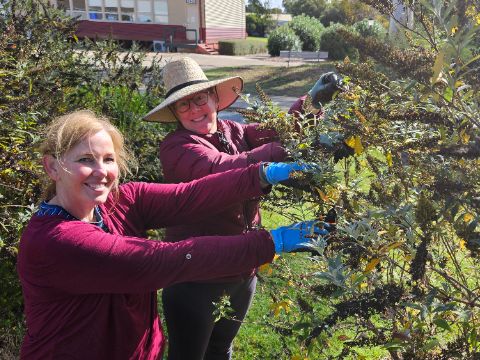- The annual UN World Bee Day theme this year ─ ‘Bee inspired by nature to nourish us all’ ─ reminds us that the decline of pollinators jeopardises food production, increases costs and exacerbates food insecurity, particularly for rural communities
Charles Sturt University students, staff and community members came together on the Bathurst campus to celebrate the annual United Nations World Bee Day on Tuesday 20 May.
 To celebrate UN World Bee Day the Charles Sturt Bathurst Campus Environmental Working Group (CEWG) staged the hands-on event on campus with the support of the International Student Office, Student Connection, and Sustainability at Charles Sturt.
To celebrate UN World Bee Day the Charles Sturt Bathurst Campus Environmental Working Group (CEWG) staged the hands-on event on campus with the support of the International Student Office, Student Connection, and Sustainability at Charles Sturt.
Similar World Bee Day events were also held at Charles Sturt campuses in Wagga Wagga and Albury-Wodonga.
Event spokesperson Dr Felicity Small, Senior Lecturer in Marketing in the Charles Sturt School of Business in Bathurst, said this year’s theme, ‘Bee inspired by nature to nourish us all’, highlights the critical roles bees and other pollinators play in agrifood systems and the health of the planet’s ecosystems.
“Pollination is essential for agrifood systems, supporting the production of more than 75 per cent of the world’s crops, including fruits, vegetables, nuts and seeds,” Dr Small said.
 “In addition to increasing crop yields, pollinators improve food quality and diversity.
“In addition to increasing crop yields, pollinators improve food quality and diversity.
“Pollinators are increasingly threatened by habitat loss, unsustainable agricultural practices, climate change and pollution, and their decline jeopardises food production, increases costs and exacerbates food insecurity, particularly for rural communities.”
The focus of the World Bee Day activities at Charles Sturt in Bathurst was on the practical things individuals can do in their own yards and in the community to protect and support all pollinators, not just bees. The event included:
- Garden work and propagation; participants learned how to propagate plants using repurposed containers and how to make their garden ‘pollinator friendly’. All participants had the opportunity to take home their own propagated plants. They pruned once flowering shrubs, planted on campus on previous World Bee Days, to foster enhanced flowering come spring. They also learned the importance of creating micro-habitats and provision of water for pollinators.
- Craft session; participants got creative with pollinator-themed crafts to complement their new plant(s).
- Waggle Dance; participants learned and performed the famous Waggle Dance (Bee dance) at 12pm, with the performance recorded for social media.
- Morning Tea; a delightful morning tea was enjoyed with fellow bee enthusiasts.
Participants had the opportunity to win a hamper of honey products kindly donated by Bathurst Honey Co.
The UN lists the following tips for individuals to try:
- plant a diverse set of native plants, which flower at different times of the year;
- buy raw honey from local farmers;
- buy products from sustainable agricultural practices;
- avoid pesticides, fungicides or herbicides in our gardens;
- protect wild bee colonies when possible;
- sponsor a hive;
- make a bee water fountain by leaving a water bowl outside;
- help sustain forest eco-systems;
- raise awareness around us by sharing this information within our communities and networks, because the decline of bees affects us all.






Social
Explore the world of social